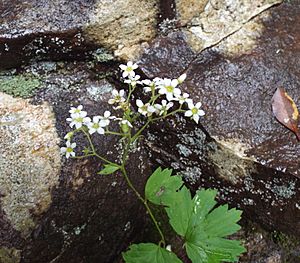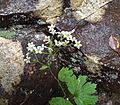Brook saxifrage facts for kids
Quick facts for kids Brook saxifrage |
|
|---|---|
 |
|
| Scientific classification | |
| Genus: |
Boykinia
|
| Species: |
aconitifolia
|
Boykinia aconitifolia, also known as the Brook saxifrage or Allegheny brookfoam, is a type of plant. It belongs to a group of plants called Boykinia. This plant is special because it has tubes inside its stems and leaves, just like our veins, to carry water and food.
You can find this plant growing naturally in the southeastern parts of the United States. It lives in states like West Virginia, Alabama, and Georgia.
Where It Grows
The Brook saxifrage loves wet places. It often grows in forests where the ground is moist, or right next to ponds and lakes. It needs a lot of water to thrive. This plant usually blooms, or flowers, during the summer months.
What It Looks Like
This plant has two main types of leaves. Some leaves grow from the very bottom of the plant, near the ground. Other leaves grow along the main stem. The stalks that connect the leaves to the stem, called petioles, can be anywhere from three to eighteen centimeters long.
The leaves themselves have interesting shapes. Many are shaped like a kidney. Others can be round or even heart-shaped. Each leaf usually has three to seven rounded sections, like small bumps or lobes. When the plant makes seeds, they are black and have tiny bumps on them.
Why It's Important
The Brook saxifrage is facing some challenges. Experts from the Southern Appalachian Species Viability Project say that this plant is at a high risk. This is mainly because of things like dirt washing into its habitats (called sedimentation) and other types of pollution. These problems can make it hard for the plant to grow and survive in its natural home.
Images for kids


